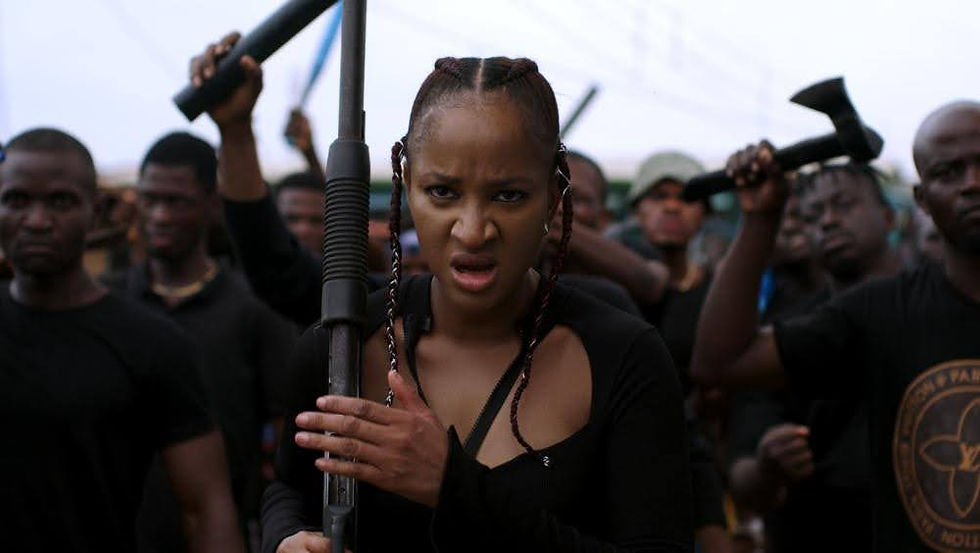Gangs of Lagos Joins Black Panther and Argo in Cultural Misrepresentation Controversy
- Sahndra Fon Dufe
- Mar 22
- 3 min read
Updated: Mar 24
Nollywood’s Gangs of Lagos Loses Legal Battle Over Cultural Misrepresentation

What does Osiberu’s “Gangs of Lagos” have in common with Black Panther, Argo and ‘The gods must be crazy’? Like Black Panther, Argo, and The Gods Must Be Crazy, Nollywood’s Gangs of Lagos Sparks Backlash Over Cultural Inaccuracy.
In a significant development for Nigeria's film industry, the producers of Gangs of Lagos and Amazon Web Services Nigeria Limited have agreed to issue an unreserved apology to the Isale Eko Descendants Union (IEDU) following a legal dispute over cultural misrepresentation. In her ruling, according to a legal document dated February 20, the presiding judge, Justice Idowu Alakija, stated that the parties involved agreed to resolve all disputes concerning the film amicably (Punch Newspaper, 2025).

Other Films Faced Backlash over Cultural Controversy: A Debate we’ve seen before-
The case has sparked diverse reactions on social media, with some defending artistic freedom and others emphasizing the responsibility of filmmakers to portray cultural symbols accurately. This debate is not new—global cinema has seen similar controversies.
James Uys’ “The gods must be crazy” (1980) was criticized for stereotyping the San people of Southern Africa (New York Times, 1984). Notably, cultural anthropologist Toby Alice Volkman highlighted the film's romanticized portrayal of the San people, contrasting it with their actual socio-economic challenges during that period.
Marvel’s Black Panther (2018) was widely praised for its use of isiXhosa as Wakanda’s official language, a choice influenced by South African actor John Kani. However, some native Xhosa speakers noted that the actors’ pronunciation and accents were not entirely authentic. Additionally, critics pointed out that while the film leaned heavily on Xhosa, it also incorporated elements of other African languages like Swahili, creating what some perceived as a linguistic blend rather than a fully immersive representation. Despite these critiques, Black Panther remains a landmark film for its commitment to African cultural representation.
Argo (2012) was also accused of misrepresenting Iranian history (The Guardian, 2013). The argument dwelled on how 'Argo' and other films misrepresent Arabs and Iranians, emphasizing that such portrayals don't reflect the realities of Middle Eastern life.
GANGS OF LAGOS: (THE PLOT)
Gangs of Lagos (2023) follows the story of a young man, Obalola, and his friends as they navigate life in Isale Eko, Lagos, caught in the web of gang violence, political corruption, and survival. Raised in the streets, Obalola dreams of a better future but is drawn deeper into the criminal underworld, facing betrayal, tough choices, and the harsh realities of his environment.
The film received praise for its gripping storytelling, action sequences, and strong performances, particularly from leads like Tobi Bakre, Adesua Etomi-Wellington, and Chike Ezekpeazu Osebuka.
However, it faced criticism for depicting the Isale Eko area as crime-ridden and portraying the revered Eyo Masquerade in a violent manner. The IEDU argued that these representations were defamatory and misrepresented their cultural heritage.


GANGS OF LAGOS: THE LAWSUIT:
The lawsuit, filed nearly two years ago, sought ₦10 Billion in damages against Amazon and the filmmakers. The court-mandated apology has been welcomed by the IEDU, whose Chairman, Adeniji Kazeem (SAN), described the ruling as a “significant precedent for protecting indigenous cultural heritage in Nigeria” (Punch Newspaper, 2025).


This case underscores the importance of cultural sensitivity and accurate representation in the media. It serves as a reminder to filmmakers about the responsibilities they bear in portraying communities and cultural symbols, emphasizing the need for thorough research and respectful storytelling.

The Gangs of Lagos dispute adds to this broader conversation on storytelling, cultural representation, and artistic responsibility. The resolution of this dispute marks a pivotal moment in Nollywood, highlighting the industry's ongoing efforts to balance creative expression with cultural respect and authenticity.

Follow Black Film Wire on Instagram and read more here.

Opmerkingen